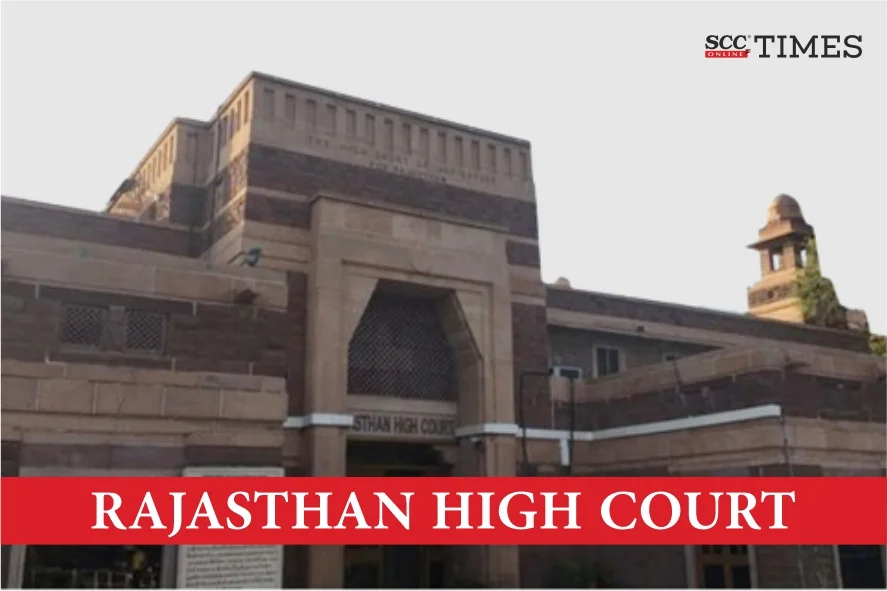Rajasthan High Court: While taking suo moto cognizance based on news reports in the “Rajasthan Patrika”, dated 18-10-2024, indicating unauthorized encroachment and construction on rivers, lakes, and other water bodies, causing environmental degradation and severe water scarcity across the nation, a single-judge bench of Anoop Kumar Dhand, J., issued notice to the respondents.
In the instant matter, the Court took notice of news reports indicating escalating encroachment and construction on rivers, lakes, and other water bodies and highlighting failure by local and national authorities to protect these resources effectively. The report emphasised on the critical need for preserving water resources, due to their essential role in sustaining life, supporting agriculture, regulating climate, and maintaining biodiversity. Despite prior government regulations, such as the River Conservation Zone Regulations, 2015 and the Environment (Protection) Act, 1986, enforcement has been minimal.
The Court noted that water is a fundamental resource essential for all forms of life. Rivers, lakes, and water bodies have been sources of irrigation, drinking water, and ecological sustenance, however, rampant encroachment and unauthorised construction around these water bodies threaten their existence, exacerbating water scarcity and environmental degradation. The Court further noted that despite directives from the Courts and National Green Tribunal (NGT) to protect these resources, illegal activities persist, while the “government administration remains largely inactive, resembling a silent spectator,” thereby, undermining the ecological balance and leading to severe water shortages.
“Entire country is facing a tremendous scarcity of drinking and potable water almost everywhere and, in fact, it is a global phenomenon. It is this reason which required Regulators/Statutory Authorities to act responsibly for protection of environment and ecology and in particular, wetland/water bodies.”
The Court noted that Rivers and water bodies are vital for climate regulation, food production, and biodiversity. The Court noted that the illegal constructions and encroachments on riverbeds, floodplains, and the catchments of rivers and their tributaries directly violate Section 24(1)(b) of the Water (Prevention and Control of Pollution) Act, 1974
The Court asserted that under Article 21 of the Constitution of India, the government is a trustee of natural resources and must protect them for public use. The Court referred to M.C. Mehta v. Kamal Nath, (1997) 1 SCC 388, the Supreme Court enunciated the doctrine of “public trust” and held that “certain common properties such as rivers, seashores, forests and the air are held by the Government in trusteeship for the free and unimpeded use of the general public. The resources like air, sea, waters and the forests have such a great importance to the people as a whole, that it would be totally unjustified to make them a subject of private ownership. The State, as a custodian of the natural resources, has a duty to maintain them not merely for the benefit of the public, but for the best interest of flora and fauna, wildlife and so on.”
“Article 21 of the Constitution of India protects not only the human rights but also casts an obligation on human beings to protect and preserve a specie becoming extinct, conservation and protection of environment is an inseparable part of right to life.”
The Court noted that the authorities have failed to effectively enforce existing protections, as noted by the NGT and recent reports of ongoing illegal activities impacting ecosystems and water availability.
The Court issued show cause notice to the respondents to explain why the following directions be not issued —
-
Formation of a State-Level Committee, chaired by the Chief Secretary of Rajasthan, to oversee the implementation of water conservation and protection schemes.
-
Formation of divisional and district committees to prevent encroachments on rivers, lakes, and water bodies, with immediate action to remove any illegal structures.
-
Immediate demolition of unauthorized constructions on riverbeds, floodplains, and catchment areas and restoration to their natural state, with regulations protecting these areas.
-
Directive to notify and enforce the River Conservation Zone Regulations promptly to prevent future encroachments.
-
Use of satellite, drone, and online monitoring mechanisms for surveillance and complaint redressal.
-
Establishment of a dedicated website with contact details, complaint mechanisms, and toll-free numbers for public reporting on illegal encroachments.
The Court further directed the Chief Secretary of Rajasthan and the Ministry of Jal Shakti to submit reports on steps taken to enforce relevant laws and prevent encroachments. The Court fixed the next date of hearing for 18-11-2024.
[Save the Rivers, Lakes & Water Bodies from Illegal Constructions and Encroachments, In re, 2024 SCC OnLine Raj 3248, Decided on 24-10-2024]







